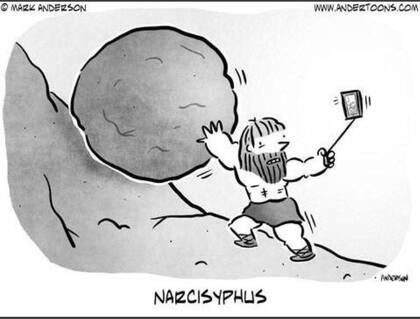Part I: The Invisible Enemy
Anxiety is a fear without object: if I am afraid of spiders, then it’s relatively simple, I avoid being around spiders as much as possible. Anxiety, therefore, is a fear that somehow, at some unknown point in time, something bad will happen and we have no control over it. In other words, anxiety is, as some politicians referred to COVID-19 threat, an “invisible enemy”.
In fact, this is precisely why some of us tend to “warify” (the war on drugs, war on terror, war on climate change, etc.) threatening things that are bigger than us. By objectifying anxiety, we give a ‘face’ to an otherwise faceless threat. It is indeed true that by immediately giving an identity to an otherwise identity-less threat, we appear to reduce anxiety. In reality, however, we are just numbing ourselves, and we end up missing the whole purpose of anxiety: to gain crucial information about our vulnerabilities and hidden fears, which is the only path toward building resiliency and truly getting rid of anxiety. Think about this as a process of immunization: you do need to directly confront the virus in order to get immunity. As it happens, I see my work with people with anxiety similar to a vaccination process. Boris Cyrulnik is a French neuropsychiatrist and ethnologist, worldwide renowned for his research and writings on resilience. He defines it as the ability to not only survive, but actually thrive when faced with visible and invisible adversity. “Anguish, sorrow and suffering can never completely take over us, or at least not more than happiness does it. A single word allows us to create a different way of understanding the mystery of those who manage to successfully go through grief and anxiety: resilience. Resilience designates our ability to succeed, to live, to grow, despite any adversity […] The paradox of human condition is that we can become our individual selves only under the influence of others.”
But resiliency is crucial not only in managing our personal life and social relationships. In the era of artificial intelligence and automation, we need to keep in mind that the machines we develop are as resilient as those who program them. Moshe Vardi is Computational Engineering Professor at Rice University. In his recent article Efficiency vs. Resiliency: What COVID-19 Teaches Computing, Prof. Vardi writes:
We must recognize the trade-off between efficiency and resilience. It is time to develop the discipline of resilient algorithms.
It is relevant to note that Boris Cyrulnik and Prof. Vardi have something very important in common, yes, they both talk about resilience, in humans and algorithms, and they both are survivor and, respectively, son of survivors, of one of the most atrocious acts done by humans to fellow humans: the Holocaust.
A few days ago, I read what I consider to be one of the most complete, balanced and effective assessment of the current global crisis. Marc Andreessen’s It’s Time to Build is, from my point of view, a kind, yet merciless invitation to not glaze over our anxiety and then collapse when the proverbial thing hits the fan. It is, overall, a courageous invitation to build: If the work you’re doing isn’t either leading to something being built or taking care of people directly, we’ve failed you, and we need to get you into a position, an occupation, a career where you can contribute to building.
I feel honored to be in the position to be “taking care of people directly”. Similarly to building a resilient nation, building your internal resiliency has to be a thoughtful, meaningful process. It takes time and it is done best and fastest under the guidance of an experienced, skilled and knowledgeable professional.
The presence of anxiety indicates vitality. Like fever, it testifies that a struggle is going on.
0 Comments
 I am fortunate to be part of #i4j, an amazing network of thought leaders who exchange ideas and look for solutions to global problems, including, of course, the current #COVID-19 world crisis. This piece is inspired by Avivah Wittenberg-Cox article about the fact that some of the countries who responded well to the COVID-19 crisis have something in common: women leaders. And what are some qualities that mattered for these leaders? Truth, Decisiveness, Tech, and last but for sure the most important, Love. However, what really rang a bell for me (as a licensed psychotherapist, culture consultant and human being) was a comment of another i4j member, Mei Lin Fung: “Women are biologically attuned to the physical and well-being of the family - and beyond”. For this is the absolute key word: ATTUNEMENT. After working individually with hundreds of people to help them manage their personal crisis, anxiety, etc., and after reviewing the afferent research, I believe that some of the biggest problems of humanity would be solved or would not exist if we elected leaders who have the ability not only to empathize with others, but also to be genuinely attuned to their needs (instead of, for example, obsessing about printing their name of the COVID-19 crisis stimulus checks). As research shows, genuine empathy cannot exist if leaders are unable to be truly attuned to others’ needs. On the other hand, a leader’s lack of attunement seems to be directly proportional to his or her level of personal insecurity, as well as with their inability to genuinely relate to their constituents, versus using them for personal financial and political gain. As Dr. Gabor Mate, MD points out, attunement has nothing to do with the mechanical imitation of a caring behavior. Moreover, “[Attunement] cannot be simulated, even with the best of goodwill […]. Attunement is necessary for the normal development of the brain pathways and neurochemical apparatus of attention and emotional self-regulation” Emotional self-regulation is the key word from my point of view. If a toddler lacks self-regulation and hits or bites the other kids on the playground, that is one thing. But when the leader of a nation lacks emotional self-regulation, consequences are social, economic and ecological tragedy and death. In a world where every single challenge is framed as a "WAR" (on drugs, on viruses, on terrorism), intuition and attunement are playing a crucial role. While intuition and attunement are arguably inherently feminine qualities, there are many men who use them in their leadership roles. The problem seems to be that this kind of leaders do not care much about publicity, for they do not experience the desperate need to trumpet their qualities. To reframe an old saying: ask not what the size of the crowd should do for you, but what you can do for the crowd. If we really care about our security and prosperity, it is crucial to support and elect intuitive and emotionally attuned leaders, who tend to make long term, sustainable decisions, instead of focusing on short term and individualistic -not to mention narcissistic- gains. |

 RSS Feed
RSS Feed
